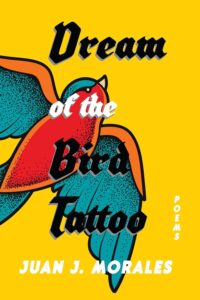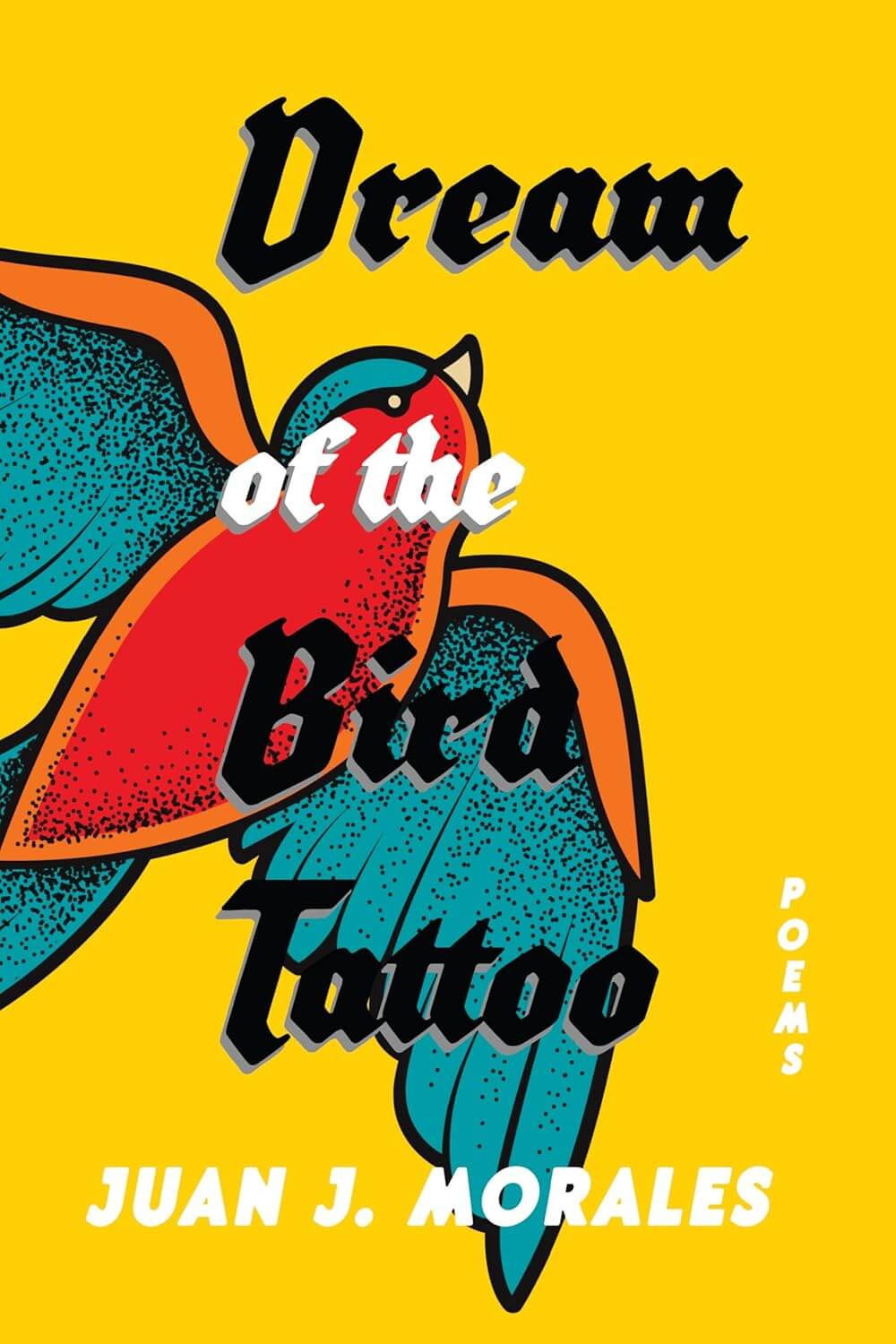The long shadow of a father
Juan J. Morales memorializes his father in poems and sueñitos
Juan J. Morales memorializes his father in poems and sueñitos
“In English, Spanish, and tears, I promised to tell his story.” — Dream of the Bird Tattoo, “Life Support”
Juan J. Morales’s new collection of poems, Dream of the Bird Tattoo, is a eulogy for his father, José Morales Lugo. Both Morales men shared the thwarted “American Dream,” the sueño americano, in which the first generation sacrifices for the next. Morales collects his poems like a dream journal, trying to interpret the meaning of each. One thread are the birds that flock his dreams, whether the swallow/golondrina that rests on his deceased father’s shoulder, or the green phoenix that rises like a flash at sunrise.

Juan J. Morales
Poet Morales writes “Of Avocados,” two halves, two hands pressed together. One side American, one side Puerto Rican, each divided by the sea, each connected to their mountain foothill home. He “walks between two loose narratives,” one entrenched in his Caribbean island heritage and the other in Pueblo, Colorado, which he calls home.
Throughout the collection, Morales is a dream weaver, blending all the cultural influences of the places he calls home. He writes of his Boricua origin: waves/olas, crabs/cangrejos, and guayberas/linen dress-shirts often worn in tropical climes. He integrates Mexican-American oral stories of the Chupacabra ( a beast with red eyes and wings) that haunt the misunderstandings of the world. Each thread has its own duende/a shadow that cleaves, a spark that ignites, his words.
The poet grapples with his relationship with his father. His Papo, “was a rock rooted in the river for me to hold on to.” A Purple Heart-awarded veteran, he never sought prizes or recognition beyond the love in  the eyes of his children. Morales realizes his father lives on, past the grave. José continues to live in the nuances of Juan’s speech: “I quote him with the same pauses and emphasis that taught us you can’t always hold compassion in your heart.” The poet echoes his father, even in his silent gestures.
the eyes of his children. Morales realizes his father lives on, past the grave. José continues to live in the nuances of Juan’s speech: “I quote him with the same pauses and emphasis that taught us you can’t always hold compassion in your heart.” The poet echoes his father, even in his silent gestures.
Morales uses repetition just as the waves drum the shore of his place of origin. The waves, las olas, sometimes crash, sometimes lap. As time erodes memory—like waves erode sand— the poet regrets, “forgetting his voice and all questions I thought I still had time to ask.” He pledges to himself, “I will learn what else I have to ask,” even if only through his dream-conversations about tattoos, the wolf that escapes from within, the spirit that saunters inside his head or the bird he has been looking for.
In invoking the “Shit My Puerto Rican Father Said.” Morales creates a living tribute to his Boricua Papo and connects this lineage to the roots he has established in the Mountain West. Morales teaches at Colorado State University Pueblo and The Colorado College. He has been keynote speaker at SOMOS: The Society of the Muse of the Southwest in Taos, NM. His writing (which includes free-verse poetry, American sonnets, and lyric essay) reaches across genres from poetry to narrative, and in the case of Dream of the Bird Tattoo, leaves an epitaph for his father: Rest in peace.
Reviewer Shelli Rottschafter’s Spanish translation:
“En inglés, español, y lágrimas, prometo contar su cuento” — Dream of the Bird Tattoo, “Life Support”
La colección de poesía nueva de Juan J. Morales, Dream of the Bird Tattoo, es un testimonio a su padre José Morales Lugo. Ambos Morales vivían un “sueño americano” quebrado, uno cual en que la primera generación sacrifica todo para la siguiente. Juan J. Morales diseña a sus poemas como si fuera un diario de sueños, en que intenta interpretar estos mismos sueñitos. Un hilo dentro de su verso son los pájaros que vuelan por imaginación, sea el tatuaje de la golondrina que sube al hombro de su papá muerto, o este fénix verde que amanece por la madrugada.
El poeta Morales escribe de aguacates: dos lados, dos manos apretadas. Un lado americano, un lado puertorriqueño, los dos divididos por el mar, los dos conectados al lomo montañoso de su hogar. Juan J. Morales camina entre dos narrativas sueltas, una con raíces en su herencia isleña caribeña y la otra en Pueblo, Colorado, el lugar que él llama casa.
La colección es donde Morales teje sus sueños, y mezcla sus influencias culturales de los lugares que llama “casa”. Escribe de su origen boricua: waves/olas, crabs/cangrejos, y guayberas/las camisas de lino típico de climas tropicales. También integra cuentos orales chicanos sobre el chupacabra (la bestia con ojos rojos y alas) que invade nuestras pesadillas y añade al mal entendimiento de nuestro mundo. Cada uno tiene su propio duende/la sombra que corta, la chispa que nace un fuego, dentro de sus palabras.
El poeta lucha con su relación con su papá. “Su Papo” existía como si fuera una roca en el río para agarrar en su inundación. Aunque su padre era un veterano apremiado, nunca buscaba el reconocimiento menos que el amor dentro de los ojos de sus hijos. Morales se da cuenta de que su papá revive más allá del entierro. José vive en las cosas sutiles como las pausas y los dichos repetidos por su hijo, Juan, donde intenta mantener una corazón compasiva. Así que el poeta resuena a su papá en los gestos silenciosos.
Morales emplea la repetición como las olas y sus movimientos por la costa de su origen. Las olas/the waves, a veces chocan, a veces laman. Mientras el tiempo erosiona la memoria – como las olas erosionan la arena – el poeta teme no recordar la voz de su papá. Siente una gran pérdida al no preguntar a su papá todo que pensaba que tenía suficiente tiempo para pedir. El poeta promete aprender todo que debería haber preguntado, aunque fuera desde conversaciones dentro de sus sueños sobre tatuajes, el lobo que escapa de su ser interior, el espíritu que resurrecta en su cerebro, o el pájaro que había buscado.
Al invocar “la mierda que su papá boricua había dicho”, Juan J. Morales crea un tributo a su “Papo Boricua” y conecta su propia linaje a los raíces que establecieron en las montañas occidentales. Morales enseña a la Universidad Estatal de Colorado en Pueblo y a Colorado College. Era un lector invitado a SOMOS: La sociedad de la musa del suroeste en Taos, Nuevo México. Su escritura (la cual incluye verso-libre de poesía, sonetos americanos, y ensayo lírico) cruza géneros desde la poesía a la narrativa, y en el caso de Dream of the Bird Tattoo, crea una legacía para su padre: en paz se descanse.
Shelli Rottschafer (she/her/ella) completed her doctorate from the University of New Mexico in 2005 in Latin American Contemporary Literature. From 2006 until 2023 Rottschafer taught at a small liberal arts college in Michigan. Summer 2023 she began her low-residency MFA in Creative Writing with an emphasis in Poetry at Western Colorado University, Gunnison. Together with her partner and rescue pup, she resides in Louisville, Colorado and El Prado, Nuevo México.
Click here for more from Shelli Rottschafer.

